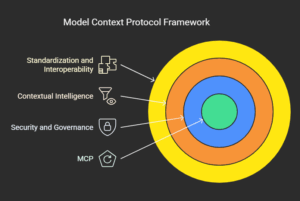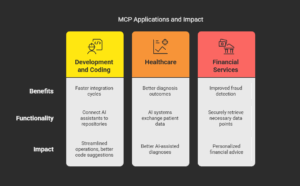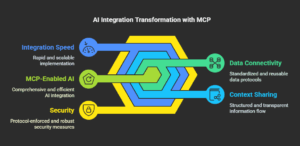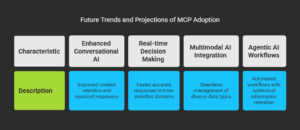
In the fast-moving era of artificial intelligence (AI), organizations face competitive pressure to implement AI within their current business operations. But a critical challenge lie in their way. Their information exists in multiple separate systems, making data integration which is key to efficient deployment of AI a riddle.
The Model Context Protocol (MCP) represents an open standard that aims to revolutionize the way AI systems connect with their data sources as well as with other AI systems.
The Data Silo Problem
Concurrent AI adoption growth within healthcare, finance and manufacturing sectors leads organizations to face consistently the same challenge of scattered data sources and split AI system connections.
AI tools and models operate alone through their custom data formats and restricted communication standards that do not meet the needs of other organizational system requirements.
Organizational fragmentation acts as an insurmountable obstacle that prevents the expansion of AI projects. Results from a 2024 survey reveal that data silos alongside integration issues pose big obstacles for enterprises trying to effectively deploy AI. The insufficient ability of AI systems to exchange data and access necessary repositories makes their operational value extremely restricted.
Traditionally, organizations resolve this challenge by creating individual connectors for new integrations, a time-consuming technique which quick becomes impractical as AI applications spread throughout the business. Multiple disconnected links between systems end up becoming difficult to both maintain and secure, as well as scale up.
Introducing the Model Context Protocol
The Model Context Protocol represents a paradigm shift in addressing these challenges. As noted, MCP is an open standard that is designed to enable secure, two-way connections between data sources and AI-powered tools. MCP aims to standardize how context, rules and goals are shared with large language models (LLMs) and other AI agents.
“Open technologies like the Model Context Protocol are the bridges that connect AI to real-world applications, ensuring innovation is accessible, transparent, and rooted in collaboration,” notes Dhanji R. Prasanna, CTO at Block.
At its core, MCP functions as a “universal connector” for AI systems, comparable to what USB-C has done for hardware devices. It provides a standardized way for different AI models to communicate with a wide array of datasets and tools. This standardization eliminates the need for custom-built integrations for each new data source or AI application.
How MCP Bridges the Gaps
The Model Context Protocol addresses the challenges of siloed data through several key mechanisms:
Standardization and Interoperability
MCP offers data exchange standards that eliminate the requirement for developing specific connectors for every information source. The adoption of MCP shortens the project implementation period, alongside keeping maintenance obligations at a minimum.
AI systems, along with databases and applications, become more interoperable through their compliance with a shared protocol, which enables smooth intercommunication between platforms. The common interface serves as a vital framework through which AI systems can completely merge their operations because they can share information that was not possible in the past.
Interoperability through the protocol also enables AI systems to unite their intelligence into cohesive AI ecosystems that facilitate model collaboration on complex operations.
Contextual Intelligence
The primary strength of MCP enables both organization and distribution of essential context. The system integrates four main components, including user intent along with role definitions and prior interactions and access permissions. The delivery of extensive contextual details through MCP allows AI models to function both competently and openly.
When healthcare AI technologies assist in patient diagnosis, they need access to specific contextual information in a medical scenario. The system equipped with MCP enables it to retrieve patient records and laboratory reports alongside suitable medical references while keeping particular case details intact. AI delivers more precise and worthwhile outputs when provided with this contextual information.
Security and Governance
The depth of AI integration into organizational operations is fast becoming a security priority for businesses. The MCP provides data protection during interactions and preserves data boundaries, and restricts access for AI agents when they handle sensitive information sources.
Organizations gain increased control over their AI systems through the protocol as it defines limits for data access and system usage. The methodical system ensures AI systems maintain a secure relationship with sensitive corporate information.
Real-World Applications and Impact
Early adopters of the Model Context Protocol include companies like Block and Apollo, as well as developer tools such as Zed, Replit, Codeium and Sourcegraph. These organizations report significant benefits, including faster integration cycles and improved AI agent performance in retrieving relevant information for tasks like coding, documentation and workflow automation.
Development and Coding
The transformation of coding repository integration and development workflows in software development environments is also enabled by the MCP. Developers now utilize MCP to connect AI assistants to GitHub repositories while generating pull requests within sixty minutes as a result of removing prior lengthy customization needs.
Transparency in the process streamlines operations so that development teams can devote their time to value creation instead of intermediary tasks. AI assistants offer more beneficial code suggestions because they maintain complete visibility into the coding standards and project requirements of an organization, together with its complete codebase context.
Healthcare
The healthcare field can use the MCP to enable different AI systems to exchange patient data information so they produce superior diagnostic outcomes and better coordinated care.Two AI models operating in a single environment combine their analysis of medical imaging data with the processing of patient history and symptoms.
MCP establishes an environment where models can exchange insights while collaborating for complete patient evaluations. The sharing of contextual information through this method enables better AI-assisted diagnoses and relieves medical professionals from the responsibilities of manual system data transfers.
Financial Services
Financial institutions handle extensive sensitive data stored on diverse systems across their networks. MCP allows organizations to implement AI solutions that securely retrieve necessary data points under defined authorization parameters.
Financial services benefit highly from complete access to data for tasks including fraud detection and personalized financial advice because this improves their overall effectiveness.
The Transformation: From Siloed to Seamless
The impact of MCP on AI integration can be clearly seen when comparing traditional, siloed approaches with MCP-enabled implementations:
|
Aspect |
Siloed AI Integrations |
MCP-Enabled AI Integrations |
|
Data Connectivity |
Custom, one-off connectors |
Standardized, reusable protocol |
|
Context Sharing |
Fragmented, ad hoc |
Structured, persistent, transparent |
|
Integration Speed |
Slow, labor-intensive |
Rapid, scalable |
|
Security |
Inconsistent, error-prone |
Protocol-enforced, robust |
|
Collaboration |
Limited, platform-specific |
Cross-platform, interoperable |
The shift offers organizations fundamental modification of their AI utilization throughout all operational units beyond basic technical efficiency capabilities. Through data silo elimination MCP establishes a comprehensive method to implement AI which allows models to ingest information from all areas of the business.
Future Trends and Projections
As MCP adoption grows, several important trends are emerging that will shape the future of AI integration:
Enhanced Conversational AI
MCP is expected to drive major advancements in conversational AI, including improved context retention, more nuanced responses and better handling of multi-turn conversations. This will make AI assistants more natural and effective collaboration partners, capable of maintaining context across extended interactions.
Real-time Decision Making
In time-sensitive domains such as finance, logistics and autonomous vehicles, MCP will enable faster and more accurate responses by providing AI systems with comprehensive, contextual information. This capability will be particularly valuable in scenarios where decisions must be made quickly based on data from multiple sources.
Multimodal AI Integration
As AI systems increasingly work with diverse data types such as, text, images, video and structured data, MCP will provide a framework for seamlessly managing these multimodal interactions across platforms. This will enable more sophisticated AI applications that can process and integrate insights from different types of information.
Agentic AI Workflows
In a developed MCP environment, AI systems will develop automated workflows by retaining contextual information during transitions between tools and datasets. Such integration enables human users to allocate their attention to key activities instead of dealing with repetitive tasks, which AI agents will process.
Conclusion
The importance of effective integration techniques for AI systems will increase since AI will become the essential foundation for organizational operations. Through MCP, organizations find a lasting solution for maximizing their data use while implementing large-scale AI solutions. Many organizations now use it as a fundamental change in their AI integration method. MCP establishes a standardized data exchange framework and context sharing platform that unifies separate systems into intelligent connected networks.
Moreover, several major technology organizations have recently adopted MCP because they view it as an effective answer to the major challenges of deploying AI systems. The developing protocol demonstrates promise by opening new AI innovation possibilities for different industries across the board. This protocol gives organizations with data silos and complex integration issues a promising view of unified AI system operation that enables seamless information access alongside proper security frameworks. The vision enables AI to develop into an organizational transformation instrument instead of remaining a technological instrument.





